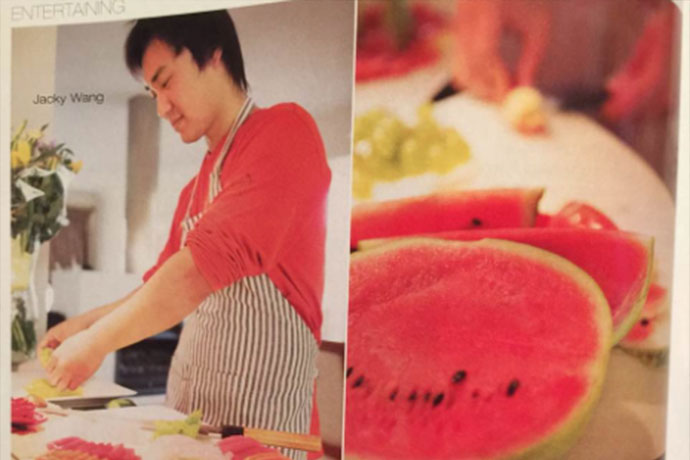They say the best sushi chefs are a mix of cook, artist and entertainer. Jacky Wang is all three – and a bundle of talent and energy.
By Nicole Allen
It was never part of Jacky Wang’s grand plan to become a sushi chef. But when life led him to cooking school rather than music classes (he had dreamed of being a traditional Chinese singer), he discovered a passion so intense that, more than a decade later, it still sustains him.
Born in a small town outside Beijing 27 years ago, Zhi Guo Wang – Jacky to his Western friends – entered chef school at the age of 15. His mission: to master the Japanese culinary art of sushi. “It was my mother’s idea,” he explains. “I didn’t work hard enough (at school) for university so she thought it would be a good career option because then ‘I’d never go hungry.’ She was right.”
Three years of intense training followed. At the end, Jacky emerged skilled in everything from how to wield sharp knives with speed and efficiency to hygienic fish preparation (“Important – you don’t want to poison guests”), traditional and contemporary cooking techniques, and plate presentation, including how to fashion intricate creations out of vegetables for decoration. “It (the whole course) was good,” Jacky recalls. “But school only teaches the basics – through experience you learn what works for you.” His next step was the local hotel industry and Jacky worked steadily in China for about six years. Then the travel bug bit and eager to explore life in a different hemisphere, he headed for South Africa. It was a bold, brave move.
Jacky arrived alone, speaking almost no English and knowing nothing of the culture here. Within weeks he’d adopted an easier-to-pronounce Western name (inspired by martial arts action hero Jacky Chan) and not long thereafter, began building a reputation in the kitchen of Tokyo, a popular Japanese restaurant in Sandton, Johannesburg. Initially, Jacky’s quick smile and willingness to work compensated for any communication difficulties. Now that he’s familiar with English (and speaks it well, despite protestations), it’s his sharp wit and cheeky charm that draw people to him. We meet at the Lotus Sushi Bar in Tradewinds Restaurant at Sandton’s Hilton Hotel where Jacky now works.
Dressed in conventional blue and white chef’s pants, with a red wraparound jacket, black apron and recent haircut (“Do I look handsome enough for photos?” he asks his boss), Jacky darts between the glossy red and black sushi bar and the restaurant’s large, industrial kitchen. His role here is two-fold: chef and teacher. Sushi’s soaring popularity has meant that his speciality is in high demand.
It has also resulted in the creation of the restaurant’s Lotus Sushi School where, on Monday evenings, Jacky runs fun, interactive sushi-making classes. He says he finds both roles equally rewarding, but the latter definitely appeals to the showman in him. “Even the most reserved people come out of their shells at Jacky’s sushi classes and Monday evenings are frequently filled with chatter and laughter,” confirms Ernst-Jan Hiltemann, the hotel’s food and beverage manager. “It’s a prime job in this city,” Jacky adds.
Away from work, Jacky spends as little time as possible in the kitchen. “I’m lazy at home,” he admits, “and often too tired to cook. If I’m hungry, I go to McDonald’s for a Cajun burger – although I prefer Japanese, Chinese and Korean foods!” His private time is spent surfing the Internet for up-to-date food ideas and inspiration, “because new trends take a while to show in South African restaurants,” or watching TV, playing tenpin bowling and, his favourite, singing karaoke with friends.
Today Jacky’s focus is firmly on cooking. He’s showing us how to make tempura – a specific type of deep-fried food that owes its origins to Portuguese missionaries visiting Japan in the 16th century. It evolved over time to suit Japanese palates and by the 19th century was a popular fast food in Tokyo, sold from sidewalk stalls and roaming pushcarts. These days, you’ll find tempura in chic city restaurants. What makes it so appealing is that tempura is remarkably light and non-greasy. Its ingredients – seafood and vegetables – are fresh and it’s also relatively quick and easy to prepare. “The secret,” says Jacky, “is in the frying technique and, as with anything, practice is key.”

